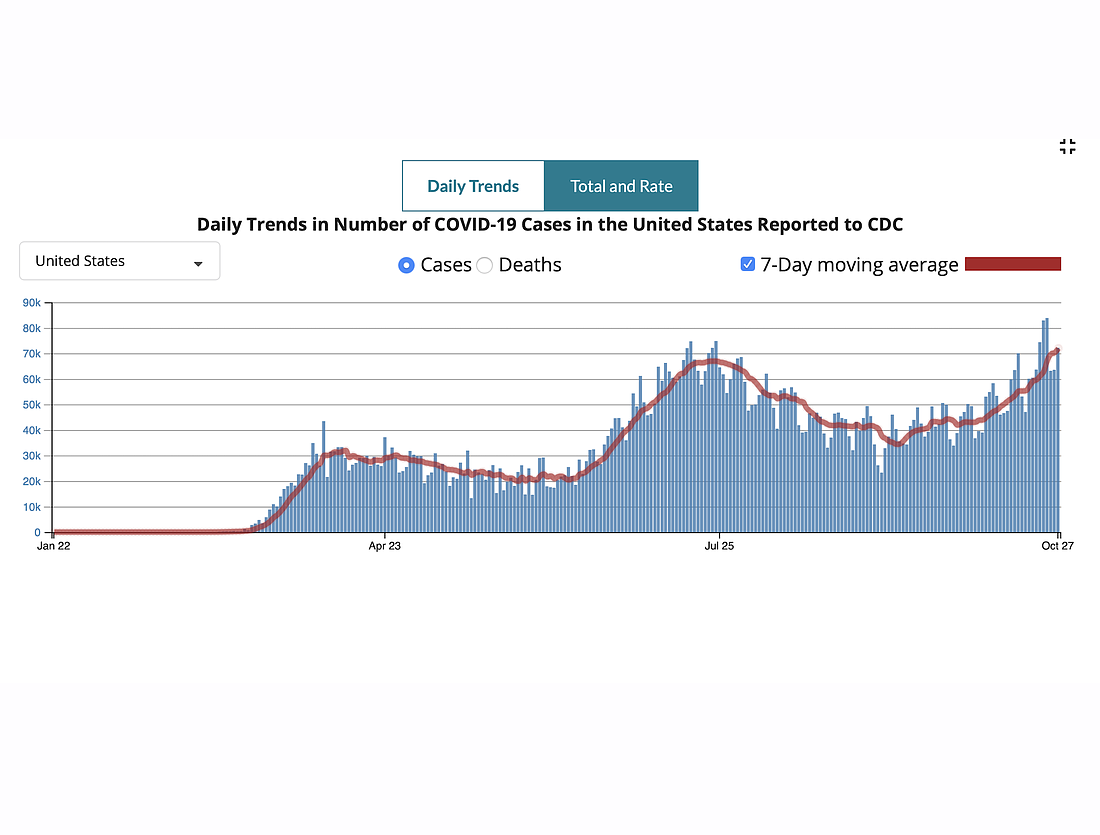- April 26, 2024
-
-
Loading

Loading

The United States is facing spiking COVID-19 numbers as the country approaches the fall holiday season, but the extent to which that will affect Florida and Flagler County aren’t yet clear.
“I think it’s fair to call it a third wave that the country’s experiencing — Florida not so much yet,” said Dr. Stephen Bickel, medical director at the Florida Department of Health-Flagler.
In the north, cold weather pushing people indoors is likely part of the reason for the spike, and and that’s less of a factor here, he noted.
But people do seem to be letting their guard down about COVID-19 safety precautions.
“People get more active; they have more parties, more social activities,” he said. “It doesn’t take much to multiply the effects.”
Europe is also experience spiking numbers, he noted.
At this point, Bickel said, rapid testing of large swathes of the population‚ including people who aren’t experiencing any symptoms, could drop COVID-19 numbers back by 50-75%, but the rapid tests in development are still working their way through regulatory hurdles.
“We’re just not testing enough,” he said. “We might be picking up 5% to10% of the infectious activity going on. ... If it’s patient-driven and it’s driven by symptoms, you‘re probably missing at least half, if not three-fourths, of their contagious period.”
"We’re in a war together, and how well we do depends on ... trying to help execute a strategy."
— DR. STEPHEN BICKEL, medical director, Florida Department of Health-Flagler
In terms of testing, Flagler has been ahead of most of the state, and has consistently been near the bottom in terms of infection rates and death rates.
Two other counties that have emphasized testing — Alachua County and Brevard County — have also experienced low infection and death rates.
Locally, Department of Health Communications Manager Gretchen Smith said, the health department has been conducting testing six days a week, and turnaround on the tests has been reduced from a range of six-to-10 days to a range of two-to-three days.
Bickel said that when COVID-19 numbers rise in a population, people tend to limit their activities — hampering the economy — even in the absence of lockdowns.
"What's been found in pretty much every country the world ... is that people self-limit themselves when the COVID activity gets bad," he said. "They stop going out; they don’t go to restaurants as much. ... Even in Sweden, were there were almost no government edicts, people’s activity was as limited as the U.S. The better we control this, the better the economy will do, as well as he health of the population."
Florida and Flagler County might derive some protection against a winter spike from Florida’s climate, since winter doesn’t drive Floridians inside, and also from the fact that the virus has already been circulating in the community.
"We have some low-level immunity," Bickel said. "It’s not approaching herd immunity, but … that may have an effect. We may not get it as bad. We’re hoping that some of the developments, like the rapid testing, can nip it in the bud. It’s quite possible that our wave, if we have one, will be delayed and subdued."
But with the holiday season approaching, he added, "If I had to make a prediction … I think that we will have an uptick in COVID."
Meanwhile, the Department of Health is predicting a more mild flu season this year as the measures that people are taking to protect against COVID-19 also help prevent the spread of the flu.
The health department has also been offering flu vaccines alongside COVID-19 testing, and a lot of people are getting vaccinated, Smith said.
"We’re getting a lot of interest," she said. "We’re trying to make it as easy as we can."
Meanwhile, a COVID-19 vaccine will likely emerge in the next month or so, but will take much longer to make its way into the population — perhaps not until mid or late spring.
Bickel hopes that rapid testing will become available in the interim, and noted that countries that have been able to control COVID-19 effectively, such as New Zealand, have relied on testing, contact tracing and high compliance with social dancing.
"We’ve lapsed periodically into this social and political divineness around COVID," he said. "We’re in a war together, and how well we do depends on ... trying to help execute a strategy. I'd just like people to keep this in mind: We really can do this if we work on it."